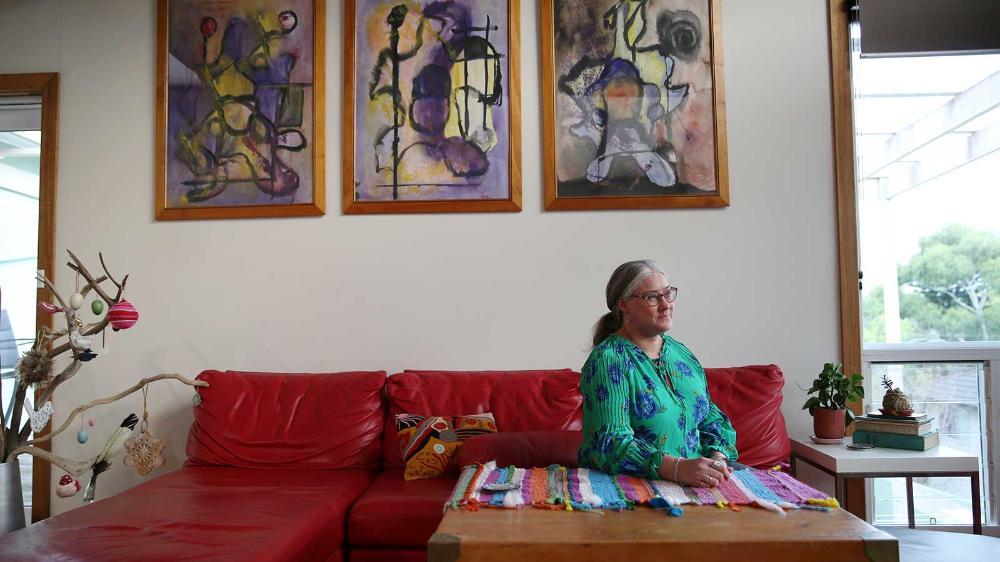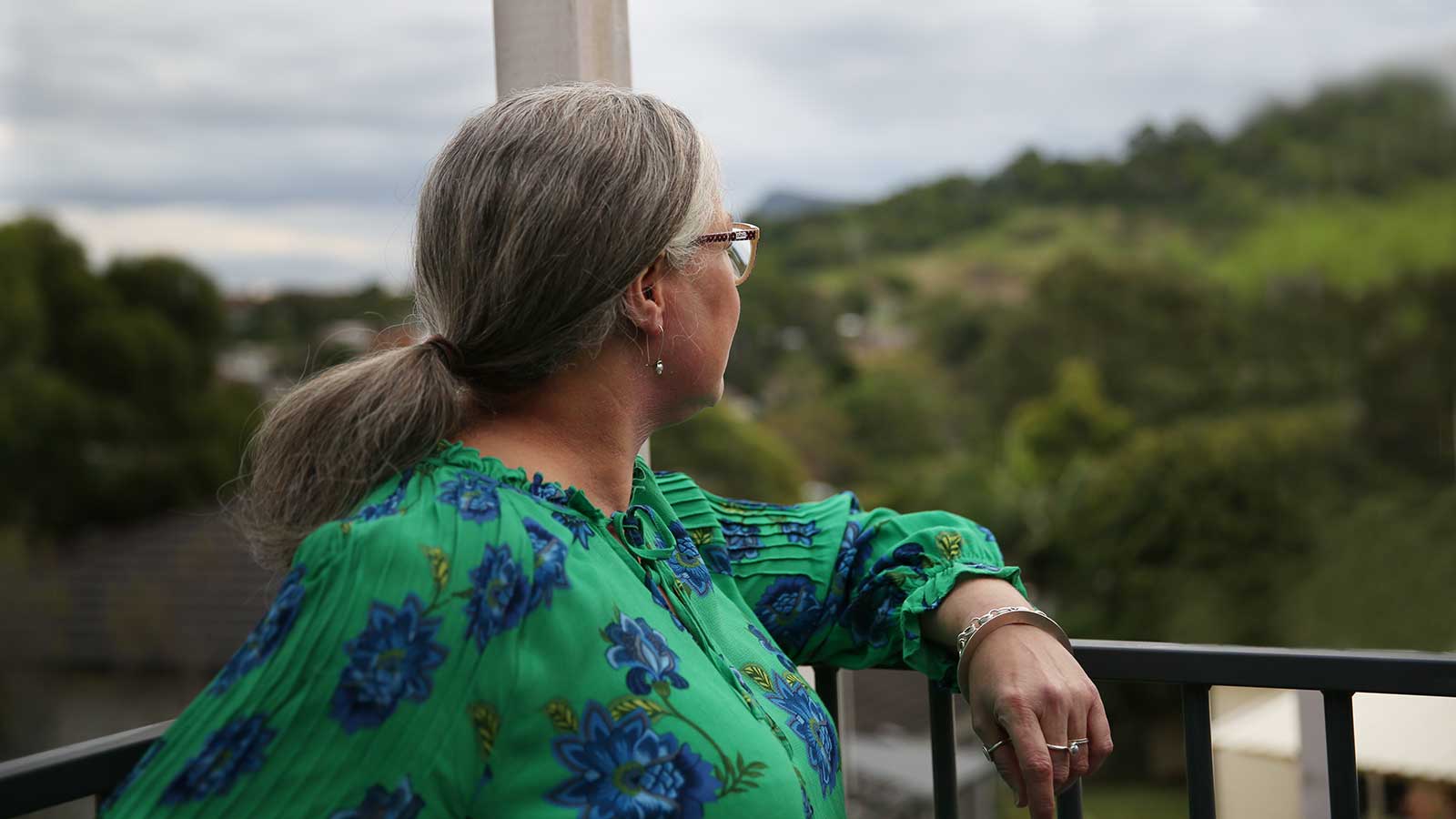UOW exists thanks to the generosity of donors
You can change lives by empowering our brightest minds and future leaders
UOW law graduate, Jenna Macnab, is flipping society’s focus about disability, ageing and decision-making ability.
April 6, 2023
Currently working with the NSW Department of Premier and Cabinet as a principal policy advisor in countering violent extremism, most of Jenna's career has been in disability. About this she says, “I didn't go into disability because I had a disability. I honestly didn’t realise – until after the first cornea transplant – that things were pretty dire.”
Jenna lives with an aggressive disease of the eyes called Keratoconus. She also has 30 years of lived experience with severe, treatment resistant depression.
About her low vision she says, “After I had my first transplant, I remember looking at my five-year-old son’s face and saying, ‘You have freckles! Really?’ I was just stoked. I couldn't believe that I could see his face well enough to see that he had freckles!
“In all the photographs I took of my kids when they were young, they have food on their faces because I could never see it.”
Over the years, Jenna has deliberately made choices that kept her career out of the courtroom and into people’s lives.
She’s done this by seeking policy work where she can effect change; specifically, policy work seeking to educate society on the rights of older people and people with disability to make their own decisions.
“It's choice and control – the autonomy of decision-making – that brings you independence.
“Imagine if you had someone who made all your decisions for you. Part of my inspiration for doing this work was to empower people who are routinely invisible in society, to ensure their voice is heard, to enable choice, and to provide equality of decision-making under the law.”
After graduating, Jenna spent two and a half years studying law at another university but quit because she found the curriculum out of touch with reality and uninspiring.
At the time, Jenna was also experiencing her first lengthy episode of depression. Describing herself as being “functionally dysfunctional” she was managing to pass her courses and work part-time, but that was all.
At 21 years of age with half a law degree up her sleeve, she quit university and worked at a local cake shop for a couple of years. It wasn’t until she heard about a new law program at UOW that she changed her mind about her future.
“UOW had a completely different approach. It wasn't just the law; it had a social justice lens. It was more. And it was hugely progressive for that time.
“That’s when I decided I’d go back.”
The program she’s referring to was designed and established by the late Jack Goldring during his time as Dean of Law at UOW from 1990 to 1995; a program that teaches students how to think critically and apply their knowledge in a social justice context – a program which still exists today. She loved the integrated approach to teaching law, which included diverse subjects and interesting assessments.
She recalls Jack’s leadership with sincere admiration.
“Jack had a different approach. He was amazing.”

Jenna says that UOW allowed her to explore how everyday people could use the law.
“It was more about human rights issues, more about equality and more about fairness. It was law with a human focus.
“It made me want to finish my degree, and it was then that I first realised that law didn't have to be about going to court.
“Upon graduating I thought, I don't want to be a court-based lawyer, right? So, I joined the public service.”
She joined the NSW Ageing and Disability Department (ADD) in a non-legal role but felt despondent about completing the six-month Practical Legal Training, a requirement for admission as a lawyer.
It was Jenna’s manager at the time, Sue Findlay, who paved the way for Jenna’s career in law. Sue encouraged her to finish the practical component even though Jenna didn’t see exactly how it would help her help others.
“She was so unbelievable. She gave me direction. She was my first mentor.
“She facilitated my transfer to the Department’s legal branch, saying, ‘You don’t have to stay there. Just do six months, or you'll lose everything you’ve worked for.’"
Jenna stayed at NSW ADD for 10 years, becoming Manager of Legal Services. During this time, she worked tirelessly on raising her three children and advocating for people with disability.
Also progressing tirelessly in the background was Keratoconus that causes blurred vision, and in Jenna’s case, perforation of the cornea requiring her to have cornea transplants.
“I could not see out of my left eye due to a continually splitting cornea. And my right eye had deteriorated. It was a progressive kind of deterioration to the point that I couldn't read, but at work that environmental barrier was removed by a program that read whatever was on my screen to me.
“For many years before the transplants, I had very low vision. I couldn't drive my kids around, or to work. I couldn’t even see faces.
“You know, people used to think I was rude because I didn’t wave back to them, because they didn't know that I couldn't see them.”
One day on her way to work, Jenna fell down a long, steep set of concrete stairs at a Sydney train station because the strip for vision-impaired people hadn’t been painted onto the steps. Jenna says this is a perfect example of how the social environment is what creates barriers for people with disability.
“It's not your impairment that creates the barrier. It's society that creates the barrier. Within a social model of disability, it is everyone’s job to think about how to make our environment accessible to all.
“And barriers aren’t just tangible, they are attitudinal as well. There are invisible disabilities and visible disabilities. And all people with disabilities are invisible in society.”

These personal and professional experiences were the catalyst for Jenna to accept a role with the NSW Attorney General’s Department (AGD). It was here that she authored the NSW Capacity Toolkit which won her the Attorney General’s Innovation Award and a nomination for a Premier’s Award.
“The toolkit translates nine different legal tests for decision-making capacity across legislation and common law into plain English. These legal tests are used across a range of sectors, including the financial, medical, legal and community sectors to decide whether older people and people with disability can make their own decisions; including where to live, what to buy, and what medical treatment to have. What I wrote had to be in language accessible to all people, including professionals and the community, and not be just legal jargon.
“It was around educating people on how to support a person to make their own decisions rather than being paternalistic and removing a person’s right to legal capacity and autonomous decision making.”
The NSW Capacity Toolkit was an enormous success, with some Australian and international jurisdictions replicating it. It can now be found online, but initially 80,000 hard copies were issued. It is still used today, along with the free Decision-making and capacity e-learning module Jenna developed.
The work around legal decision-making capacity was important to Jenna. As a person with a psychosocial disability, she explained how at times, she experienced periods where she struggled with decision-making.
“At some points I’ve needed people to make decisions on my behalf, for example about hospitalisation or treatment. Other times I may have appeared to lack decision-making skills, but all I needed was some support. Someone to stand alongside me, not to make my decisions, but to assist me to do so.
“Decision-making ability is a spectrum, and any given day I could be anywhere on that spectrum.”
Jenna points out that assuming people with disability lack decision-making ability is one of the attitudinal barriers many people with psychosocial disability, intellectual disability and acquired brain injury face. Also, older people.
She reflects that, while having electro-convulsive therapy (ECT) for depression was difficult and humiliating, the emotional pain involved would have been exponentially worse had it not been her decision.
“I already felt powerless without having been forced to do ECT. I couldn’t even imagine how denigrated you’d feel if someone else made the decision to do it for you.”
Jenna largely credits successfully balancing her career, with family, and mental ill health, to her second mentor – Manager of Diversity Services, Julia Haraksin.
“Julia saw me as a person first, then a person with severe depression and low vision. With this, she took the stigma away.”
Jenna learned that while disability can be alienating and discrimination is real, the law can be used as a tool to enhance human rights for people with disability.
“But there is no use having legal rights when there are still attitudinal barriers. People need to be educated in the law and why it is important for upholding the social model of disability. That’s why the toolkit is so important.”
The projects Jenna has, and is currently working on are varied, complex, layered and have a significant real-world impact; including for example her role in the NSW Department of Communities and Justice's (DCJ) transition to the National Disability Insurance Scheme (NDIS); one of the largest and most significant policy changes Australia has ever undertaken.
Over the years she completed a Master of Public Administration at the University of Sydney via an NSW Government sponsored place and attained the highest rank in her cohort, and today she’s in the final stages of a PhD with La Trobe University.
Jenna’s advice to early career lawyers is to seek out supportive mentors from a young age, mentors who can help them use their legal career in a way that aligns with their values, and to be patient and not too critical of themselves.
“I think when you're trying to create a career, have meaningful family relationships, look after your well-being and still keep your hobbies and interests, it’s important to remember that you can do it all, just maybe not all at once.”
--
Jenna Macnab
Bachelor of Arts / Bachelor of Laws (Hons)
Masters in Public Administration
PhD Candidate
You can change lives by empowering our brightest minds and future leaders